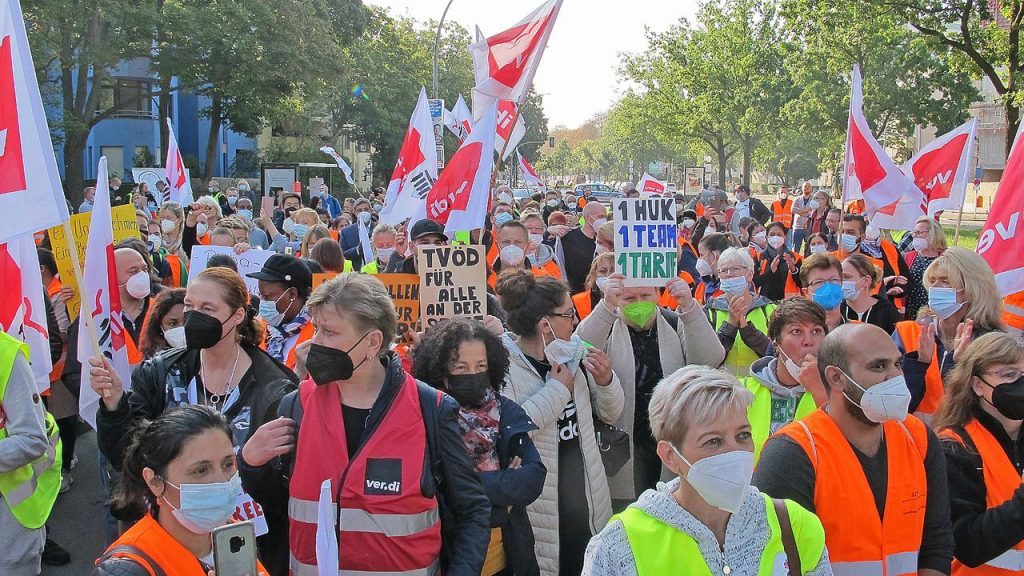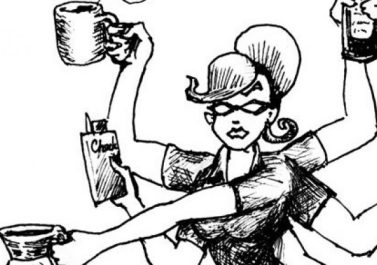A few updates after recent staffing disputes at hospitals in Germany

Here in the UK, we’re looking at another gruelling effort to mobilise enough of our NHS co-workers to vote against the recent, government imposed wage cut. It would definitely be easier to motivate colleagues if the issue of pay was combined with the problem of stress at work due to chronic understaffing. You can read this insightful interview with a nurse from the UK, which can hopefully help get the ball rolling in terms of discussion and organising.
In Germany we have seen hospital workers going on strike over staffing levels – initially in the two biggest hospitals in Berlin, then more recently in six university clinics in North-Rhine Westphalia. The main demand of the strikers was to implement a new collective contract, which would guarantee hospital workers who work on understaffed shifts extra time off in compensation. Both series of strikes were successful in the sense that the day-to-day divisions between different wards and groups of workers in the hospital were undermined through collective action and that new staffing-related contracts could be introduced.
A few months after the strikes, however, the struggle to enforce the details of the contracts is continuing. As long as a collective mass of workers is on the move, management feels that they have to agree to changes. As soon as they only face a few union or works council negotiators, they think that they can go back on their word or find loopholes. Below you can find short updates from Berlin and from North Rhine Westfalia.
Berlin
Hospital workers in Berlin went on strike for seven weeks to enforce a new contract. Now, nine months later, management is slow to implement the new staffing system. They’re finding loopholes and excuses, e.g. they claim that the development of software to record actual staffing levels takes a long time. As always the devil is in the detail. Management tries to exclude the handover time on understaffed shifts from the calculation of future compensatory time off. They built in traps, e.g. if a lead nurse, who normally has just a coordinating and advisory role, does not explicitly record that she isn’t engaging in bed care at the start of each shift, they will automatically be included as ‘care staff’.
Workers are also facing an increase in the chances of being moved around internally. If a ward is better staffed, people are moved around to wards where management would have to grant compensatory time off due to understaffing – the small margins to avoid having to compensate workers becomes the prime focus, not actual staffing shortages or care emergencies.
The management of the two hospitals also tries to undermine the future unity of workers. For example, anyone who works on their day off is supposed to be paid a significant bonus, but now groups of workers are excluded from this, such as imaging assistants. Management at one of the hospitals has recently offered a slight pay increase for 800 out of 2,100 workers, but workers who are newly hired for the same jobs will be paid less, which will introduce a two-tier workforce.
North Rhine Westphalia
In North-Rhine Westfalia, workers at six of the bigger university hospitals went on strike for eleven weeks during summer 2022. Apart from better staffing. workers demanded the end of the ‘flat-rate per patient’ system.This means that hospitals are not paid by the health insurance for the actual work they perform, but instead they receive a fixed amount of money for a specific intervention, e.g. in the case of a kidney operation, they are not paid for the actual (wo)men hours of an actual amount of staff, but a fixed amount for an ‘ideal’ operation.This system is supposed to create an incentive to save money by using less resources – which in the end means, making less workers work more, or focusing on the best paying treatments. As a result of previous protests, bed care has been excluded from this system, but workers in theatres and some other departments are still subjected to it. The strikes did not manage to abolish this division.
Another problem is that the newly-won terms allows management to take one and a half years to introduce the new staffing system. The union also compromised on other fronts. Admin workers, kitchen and transport workers and even ambulance staff are excluded from the compensatory staffing model. Management only offered a puny amount of additionally recruited staff for these hospital sections. This is particularly painful, because it was workers in these sections who massively supported the industrial action. The union also agreed to reduce the number of delegate workers who could take part in the negotiation process. Initially there were 60 worker delegates in the negotiating committee; this was reduced to 18 during the final process of negotiations.
While most workers agree that the strike brought them closer together and that the result is largely positive, it becomes clear that the struggle against divisions and against being ‘managed from the top’ continues! Hopefully we will be able to invite some fellow workers from Germany to a public zoom meeting soon where we can talk about their experiences during and after the industrial action – watch this space!



